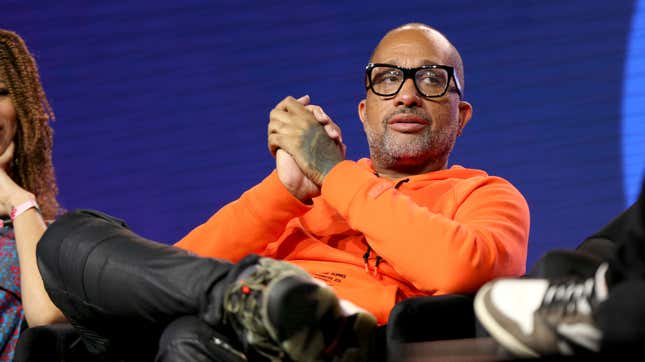
Potential audiences recently got a first look at the first television show of Kenya Barris’ big Netflix deal, Black Excellence (stylized as #blackexcellence).
As Deadline announced, Genneya Walton (9-1-1, Project Mc²), Iman Benson (Suits, Alexa & Katie), Scarlet Spencer (Cousins for Life, Colony), Justin Claiborne (Marriage Story, Reverie), Ravi Cabot-Conyers (The Resident) and Richard Gardenhire Jr. joined Rashida Jones and Barris in the cast lineup.
About the show, Deadline adds:
Inspired by Barris’ irreverent, highly flawed, unbelievably honest approach to parenting, relationships, race, and culture, #blackexcellence flips the traditional sitcom family on its head. Pulling back the curtain, the series uncovers and explores the messy, unapologetic and often hilarious world of what it means to be a “new money” Black family trying to get it right in a modern world where “right” is no longer a fixed concept.
Walton is 18-year-old Chloe Barris, the effortlessly popular, under appreciative college student with an astounding level of entitlement. Benson plays 17-year-old Drea Barris, the moral center and Narrator of the show. Spencer is 12-year-old Izzy Barris, who’s difficult for difficulty’s sake, a pain-in-the-ass contrarian whose lack of caring only makes people want to mess with her more. Claiborne plays Pops Barris, 10, as lovable as he is gullible. Cabot-Conyers is 8-year-old Cam Barris, a miscreant trouble maker and a pathological liar with the best laugh you’ve ever heard and a grin that lets him get away with anything. Gardenhire Jr. recurs as 3-year-old Brooklyn Barris, who’s jarringly smart and well-spoken for a toddler.
Once the casting photo debuted, many people in Black Twitter noticed a lack of…hue variety.
Look, I get it, creators are always told to “write what you know.” Most often, our stories are borne out of our own experiences. But, I’d lend more credence to Barris’ assertion if he hadn’t already created three hugely successful shows (Black-ish, Grown-ish, and Mixed-ish) about his family. The only thing I can wager is that he is likely repurposing his family story on the new platform because Netflix will allow him to cuss more and broach riskier topics with less censorship than a network television platform like ABC would.
And yet, as a clear gatekeeper with a show titled Black Excellence, Barris has to recognize that the optics of a light-skinned family (save for maybe Benson, who appears much darker in comparison) representing such is certainly enough to raise a few eyebrows here and a few side-eyes there.
Obviously noticing the critiques, Barris took to Twitter to respond, noting, “I’m also not gonna make up a fake family that genetically makes no sense just for the sake of trying to fill quotas. I LOVE MY PEOPLE and everything I does [sic] reflects that love. But to cast people like some kinda skin color Allstar game would actually do more harm than good.”
“The answer is to make sure we keep making good programming and depict ALL our beauty in real ways and roles that show the world the broad spectrum of who we are in REAL ways for EVERYONE 2 c [sic], he continued. “I really appreciate ur comments & I hardly ever react to social media but this cut me a little. These kids look like my kids. My very Black REAL kids & they face discrimination every day from others outside our culture and I don’t want them to also see it from US.”
“I’m going to say this and then let what happens happen... Colorism is a divisive tool used by the powerful to separate the truly powerful,” Barris concluded.
Colorism is a very real (not just real-ish) tool of white supremacy. It is the very “divisive tool” used to implement shorter prison sentences for lighter skin, influence employers and hiring practices and dictate sociopolitical practices such as skin bleaching, access to beauty products and beyond.
In fact, the inference that discussing colorism is the real issue and not colorism itself sounds awfully similar to racists who claim black folks who call out racism are the “real racists.”
This isn’t excellence, it’s a fail. Whew, we got a lot more work to do...

